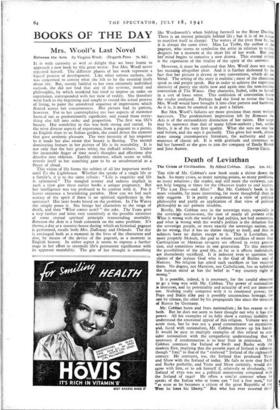BOOKS OF THE DAY
Mrs. Woolf's Last Novel
Between the Acts. By Virginia Woolf. (Hogarth Press. 7s. 6d.)
It is with curiosity as well as delight that we have learnt to approach a new book by this great writer. For Mrs. Woolf never repeated herself. The different phases of her work represent a logical process of development. Like other serious authors, she was concerned to convey what she felt to be the essential truth about life. But, sternly faithful to her own extremely individual outlook, she did not find that any of the systems, moral and philosophic, by which mankind has tried to impose an order on experience, corresponded with her view of reality. She therefore went back to the beginning and sought to record the actual process of living, to paint the unordered sequence of impressions which floated across her consciousness. Her picture had its pattern, however. For to her contemplative eye two aspects of existence loomed out as predominantly significant, and round them every- thing else fell into order and proportion. The first was life's beauty. Her sensibility to this was both strong and varied. In the most diverse aspects of experience, from a pageant to a picnic, an English slum to an Italian garden, she could detect the element that gave aesthetic pleasure. The very intensity of her response to it made her also aware that beauty is fleeting. The second dominating feature in her picture of life is its mutability. It is not only that the hair grows white, the daffodil withers. Under the inexorable finger of time man's thoughts and affections also dissolve into oblivion. Earthly existence, which seems so solid, reveals itself to her searching gaze to be as unsubstantial as a fleece of cloud.
This vision of life forms the subject of all her important works until To the Lighthouse. Whether she speaks of a single life or a family's, it is to The same refrain : " Life is exquisite and life is ephemeral." The mingled ecstasy and sadness implicit in such a view give these earlier books a unique poignancy. But her intelligence was too profound to be content with it. For it leaves existence a bewildering paradox. How can we feel such ecstasy of the spirit if there is no spiritual significance in the universe? Her later books brood on the problem. In The Waves she simply poses it. She brings her characters to the verge of death, and then " What comes next? " she asks. The Years goes a step farther and hints very tentatively at the possible existence of some eternal spiritual principle transcending mortality. Between the Acts is a fresh comment on the same problem. It's theme, a day at a country-house during which an historical pageant is performed, recalls both Mrs. Dalloway and Orlando. The day is envisaged both as a moment in the lives of the characters and also, by means of the device of the pageant, as a moment in English history. In either aspect it seems to express a further stage in her effort to reconcile life's permanent significance with its apparent mutability. The gist of her thought is something
like Wordsworth's when bidding farewell to the River Duddok There is an eternal principle behind life ; but it is of its nature to manifest itself in change. The waters of the river flow by, but it is always the same river. Miss La Trobe, the author of the pageant, who seems to symbolise the artist in relation to reality, despairs for a moment at the short life of her work. But soon hcr mind begins to conceive a new drama. This eternal rebirth is the expression of the vitality of the spirit of the universe.
However, it must be confessed that Mrs. Woolf does not make her meaning altogether clear. And it is further darkened by the fact that her picture is drawn in two conventions, which do not blend. The setting of the story is realistic ; most of the characters speak as real people speak. But in order to achieve the expressive intensity of poetry she shifts now and again into the non-realistic convention of The Waves. One character, Isabel, talks to herself in a sort of loose verse. This confusion of convention leaves the reader confused. Perhaps had she lived to revise the book Mrs. Woolf would have brought it into clear pattern and harmony. As it is, it must be counted as in part a failure.
But Mrs. Woolf's failures are more precious than most writer's successes. The predominant impression left by Between the Acts is of the extraordinary distinction of her talent. Her scope may be narrower than that of many fellow-authors ; but, unlike theirs, it is of the very first quality. What she says no one has said before, and she says it perfectly. This gives her work, almost alone among contemporary literature, the authority and per- manence of classic art. It is with gratitude and reverence we bid her farewell as she goes to join the company of Emily Bronti

























 Previous page
Previous page